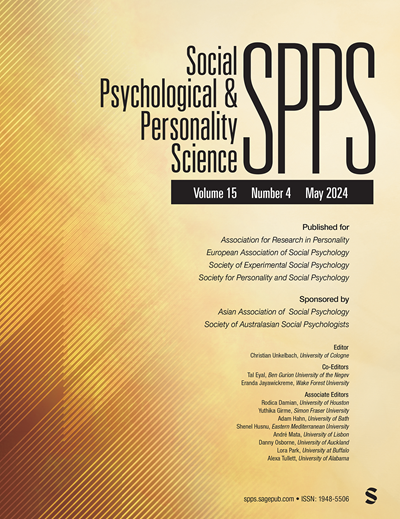对收入分配的经济不平等和不公平评价可负面预测政治和社会信任:拉丁美洲 23 年来的证据
IF 3.3
2区 心理学
Q1 PSYCHOLOGY, SOCIAL
引用次数: 0
摘要
关于经济不平等与社会和政治信任之间关系的研究结果喜忧参半。这些研究过度代表发达国家,采用横截面设计,忽视了对不平等的主观评价的作用。我们利用 18 个拉美国家 23 年间的 13 次调查(超过 25 万参与者),研究了结构性不平等和公平性评价与政治和社会信任之间的关系。比较纵向调查的多层次回归分析表明,国家内部经济不平等随时间的变化与政治和社会信任负相关。然而,国家间的不平等与社会信任呈负相关,但与政治信任无关。此外,对不平等的公平评价与社会和政治信任正相关。探索性分析表明,公平性评价是经济不平等与政治和社会信任之间负相关的中介。我们讨论了不平等的公平性评价可能会解释为什么不平等会影响社会和政治信任。本文章由计算机程序翻译,如有差异,请以英文原文为准。
Economic Inequality and Unfairness Evaluations of Income Distribution Negatively Predict Political and Social Trust: Evidence From Latin America Over 23 Years
Research has produced mixed results on the relationship between economic inequality and social and political trust. These studies overrepresent developed countries, cross-sectional designs, and overlook the role of subjective evaluations of inequality. We use 13 waves from 18 Latin American countries over 23 years (above 250,000 participants) to examine the association between structural inequality and fairness evaluations with political and social trust. Multilevel regression analyses for comparative longitudinal surveys suggest that within-country changes in economic inequality over time are negatively associated with political and social trust. However, between-country inequality was negatively related to social trust but not political trust. In addition, fairness evaluations of inequality were positively related to social and political trust. Exploratory analyses revealed that fairness evaluations mediated the negative association between economic inequality and political and social trust. We discussed that fairness evaluations of inequality may explain why inequality affects social and political trust.
求助全文
通过发布文献求助,成功后即可免费获取论文全文。
去求助
来源期刊

Social Psychological and Personality Science
PSYCHOLOGY, SOCIAL-
CiteScore
12.50
自引率
1.80%
发文量
77
期刊介绍:
Social Psychological and Personality Science (SPPS) is a distinctive journal in the fields of social and personality psychology that focuses on publishing brief empirical study reports, typically limited to 5000 words. The journal's mission is to disseminate research that significantly contributes to the advancement of social psychological and personality science. It welcomes submissions that introduce new theories, present empirical data, propose innovative methods, or offer a combination of these elements. SPPS also places a high value on replication studies, giving them serious consideration regardless of whether they confirm or challenge the original findings, with a particular emphasis on replications of studies initially published in SPPS. The journal is committed to a rapid review and publication process, ensuring that research can swiftly enter the scientific discourse and become an integral part of ongoing academic conversations.
 求助内容:
求助内容: 应助结果提醒方式:
应助结果提醒方式:


